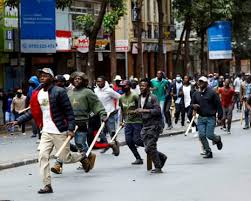Thousands of demonstrators flooded the streets of Nairobi and other Kenyan cities on Wednesday to mark the first anniversary of the country’s deadliest protest day in recent history, defying fears of police crackdowns and attacks by state-linked gangs.
The protests commemorate the July 2023 demonstrations, during which at least 60 people were killed by security forces during nationwide unrest over tax hikes and worsening economic conditions. Human rights organisations say many victims were shot during peaceful marches, mostly involving young Kenyans.
This year’s rally, led by civil rights groups and families of the deceased, called for peaceful remembrance. Still, a heavy police presence and barricades choked access to central Nairobi, with razor wire sealing off key government buildings.
Protesters—mostly youth—chanted “Ruto must go,” waved Kenyan flags, and held placards bearing the faces of those killed last year. President William Ruto, elected in 2022 on promises of reform and economic relief, now faces mounting criticism for perceived inaction and repression.
“I came here because our fellow youth were murdered last year,” said Eve, a 24-year-old protester. “The police should protect us, not kill us.”
Angel Mbuthia, youth leader of the opposition Jubilee Party, reflected on the day’s emotional weight. “They lost people who look like them, who speak like them, who were fighting for good governance,” she said.
The demonstrations follow the recent death of 31-year-old blogger and teacher Albert Ojwang in police custody. Ojwang, who had allegedly criticised a senior officer online, died under unclear circumstances, sparking fresh outrage over police brutality. Six suspects, including three police officers, have been charged with murder but deny any wrongdoing.
Although Kenyan authorities maintain that peaceful protests are permitted, rights groups say intimidation is on the rise. Last week, a nonviolent rally was reportedly disrupted by armed gangs on motorcycles, believed to be acting in coordination with police.
Western embassies, including those of the U.S., UK, and Canada, released a joint statement urging Kenyan authorities to protect the right to peaceful assembly and ensure transparency in policing. “The use of plainclothes officers in unmarked vehicles erodes public trust,” the statement warned.
In response, Kenya’s Ministry of Foreign Affairs defended the government’s stance, calling on international partners to respect the country’s internal processes and allow national institutions to address any alleged abuses.
Disillusionment with Ruto’s administration continues to grow, particularly among the youth who say they feel betrayed. While last year’s protests forced the government to withdraw a controversial finance bill, many believe the broader governance and transparency issues remain unresolved.
Human rights groups report over 80 enforced disappearances of government critics since 2023, with many still missing. Despite earlier pledges to end such practices, President Ruto defended security forces this week, stating, “You cannot insult or threaten the police. You are threatening our nation.”
As protesters returned to the streets to honour the fallen and demand accountability, concerns are rising that Kenya could be sliding back into an era of state repression. Many are calling for urgent reforms to prevent history from repeating itself.









